Nihilism and the Crisis of Meaning in Human Life
Nihilism is a philosophical view that asserts that life has no objective meaning or value. This view is considered one of the outcomes of the crisis of meaning in human life, where individuals no longer believe in the values and beliefs they held before. In this essay, we will discuss the nihilistic perspective and its impact on the crisis of meaning in human life.
Nihilistic Perspective According to Nietzsche, nihilism is the logical consequence of the death of God, which is the loss of belief in the existing values. Nietzsche believed that matters such as truth, goodness, and beauty no longer have a strong foundation because that foundation was based on God, who is now dead. Therefore, individuals no longer have a strong basis for determining the meaning of their lives.
Impact of the Crisis of Meaning Nihilism can cause a crisis of meaning in human life, where individuals no longer have a clear direction or purpose. This can lead to dissatisfaction and anxiety, as individuals feel that they have lost the meaning of their lives. Additionally, the crisis of substance can cause individuals to become desperate and engage in unethical behavior that can harm themselves and others.
Solutions to the Crisis of Meaning Although nihilism can cause a crisis of meaning in human life, it does not mean that there are no solutions to overcome this problem. One solution is to find meaning in life by engaging in activities that have clear values and goals. Additionally, individuals can find meaning through positive interpersonal relationships, such as family, friends, and community.
Nihilism and the crisis of meaning are serious problems in human life. Although the nihilistic perspective can cause sense trouble, solutions exist to overcome this problem. Individuals can find purpose in life by engaging in activities that have clear values and goals and by developing positive interpersonal relationships. Therefore, individuals need to continue seeking and finding meaning in their lives.
References:
Nietzsche, F. (2003). The Will to Power. Vintage. Heidegger, M. (1992). Nietzsche, Volume II: The Eternal Recurrence of the Same. HarperCollins. Solomon, R. C. (2003). Living with Nietzsche: What the Great "Immoralist" Has to Teach Us. Oxford University Press. Deleuze, G. (1983). Nietzsche and Philosophy. Columbia University Press.



Komentar
Posting Komentar